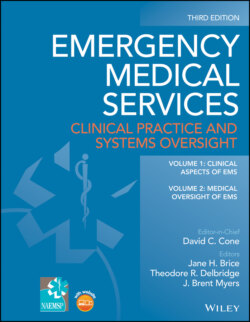Читать книгу Emergency Medical Services - Группа авторов - Страница 444
Other considerations
ОглавлениеThe EMS clinician should assess not only the specific diabetic emergency, but also consider the reason behind the glycemic dysregulation. The possibility of intentional overdose in the hypoglycemic depressed patient, or of inadvertent overdose in the elderly or confused patient, should be considered. Attention should be paid to the patient’s type of insulin or medication. Long‐acting insulin use may require close monitoring of the patient by a responsible adult at home or continuous monitoring and additional treatment at the hospital. Patients taking certain oral hypoglycemic agents such as sulfonylureas should be transported to the hospital, because they have a higher risk of recurrent hypoglycemia and, by extension, increased morbidity.
Hyperglycemia should prompt prehospital personnel to think about infectious sources such as urinary tract infection or pneumonia, especially in elderly or debilitated patients. Other acute illnesses, such as myocardial infarction, stroke, or pancreatitis, and recent cocaine use can also cause hyperglycemia in the diabetic patient. Of course, poor compliance with medication regimens may be a factor, as well.
